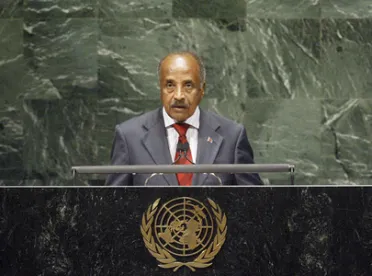Statement
Statement summary
OSMAN SALEH, Minister for Foreign Affairs of Eritrea, said that, while prospects for a rapid reform of the United Nations system appeared to be dim, Member States must not give up, and instead should continue to speak out and work tirelessly for an Organization that was fit for the twenty-first century, as well as for a more just and equitable world. At the same time, Members needed to focus on their own nations and regions to ensure peaceful, stable environments and dignified lives for their peoples.
He said that Eritrea sought, through robust and constructive engagement, to make its modest contribution to global peace, security, justice and equity, and to the protection and enhancement of the environment in the face of changes that threatened the very survival of humanity. Regionally, the Eritrean Government’s efforts were directed at securing peace, stability, development and cooperation in the wider Horn of Africa and the Red Sea region. Reviewing the specific situations in Sudan, Somalia as well as Eritrea’s own relations with Ethiopia respectively, he said his country was working closely with the Sudanese parties, as well as with regional and international actors, as that country entered a critical period in its history. He believed that the international community as a whole needed to wholeheartedly support the parties to the Comprehensive Peace Agreement as the country approached the historic referendum set for January 2011, and beyond.
On Somalia, he said it was Eritrea’s view that there could be no military solution to the problems in that country, given the bitter experience and spiralling violence of the past two decades. While that was a conviction that by now was widely shared in the international community, serious doubts continued to be raised as to whether the alternative — a Somali-owned and Somali-driven inclusive political process — was possible and practicable. In that regard, he urged the United Nations and all those concerned with peace and security in Somalia to earnestly engage all Somalis and to give the political process the serious and sustained attention it deserved.
Closer to home, he charged that while the United Nations grappled with Sudan and Somalia, the Organization continued to ignore the grave consequences of Ethiopia’s continued occupation of Eritrean territory, eight years after the ruling of the Eritrea-Ethiopia Boundary Commission, and three years after the Commission had ended its work by depositing in the United Nations the demarcated boundary between the two countries. Ethiopia’s illegal occupation and the United Nations silence, which meant the continuation of the conflict, was exacting a heavy price on the peoples of both countries and complicating the regional situation. He went on to say that Eritrea’s constructive engagement on regional and international matters stemmed from its firm conviction that a conducive, external environment was essential for nation-building.
Full statement
Read the full statement, in PDF format.
Photo

Previous sessions
Access the statements from previous sessions.
